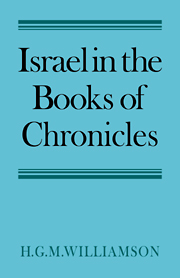Crossref Citations
This Book has been
cited by the following publications. This list is generated based on data provided by Crossref.
1982.
Juda unter Assur in der Sargonidenzeit.
p.
383.
Boardman, John
Edwards, I. E. S.
Hammond, N. G. L.
and
Sollberger, E.
1982.
The Cambridge Ancient History.
Mitchell, T. C.
1982.
The Cambridge Ancient History.
p.
442.
Halpern, Baruch
1983.
The Resourceful Israelite Historian: The Song of Deborah and Israelite Historiography.
Harvard Theological Review,
Vol. 76,
Issue. 4,
p.
379.
Davies, W. D.
and
Finkelstein, Louis
1984.
The Cambridge History of Judaism.
Ackroyd, Peter
1984.
The Cambridge History of Judaism.
p.
130.
Demsky, Aaron
1986.
The Clans of Ephrath: Their Territory and History.
Tel Aviv,
Vol. 13,
Issue. 1,
p.
46.
Ben Zvi, Ehud
1988.
The Authority of 1-2 Chronicles in the Late Second Temple Period.
Journal for the Study of the Pseudepigrapha,
Vol. 2,
Issue. 3,
p.
59.
Whitelam, Keith W.
1989.
Israel's Traditions of Origin: Reclaiming the Land.
Journal for the Study of the Old Testament,
Vol. 14,
Issue. 44,
p.
19.
Na'aman, Nadav
1991.
The Kingdom of Judah Under Josiah.
Tel Aviv,
Vol. 18,
Issue. 1,
p.
3.
Boardman, John
Edwards, I. E. S.
Sollberger, E.
and
Hammond, N. G. L.
1992.
The Cambridge Ancient History.
Mitchell, T. C.
1992.
The Cambridge Ancient History.
p.
410.
Mitchell, T. C.
1992.
The Cambridge Ancient History.
p.
322.
Mitchell, T. C.
1992.
The Cambridge Ancient History.
p.
371.
Zvi, Ehud Ben
1993.
A gateway to the chronicler's teaching: The account of the reign of ahaz in 2 chr 28,1–27.
Scandinavian Journal of the Old Testament,
Vol. 7,
Issue. 2,
p.
216.
Lewis, D. M.
Boardman, John
Hornblower, Simon
and
Ostwald, M.
1994.
The Cambridge Ancient History.
Tadmor, Hayim
1994.
The Cambridge Ancient History.
p.
261.
Gelston, Anthony
1996.
The end of chronicles.
Scandinavian Journal of the Old Testament,
Vol. 10,
Issue. 1,
p.
53.
Zadok, Ran
1998.
On the Reliability of the Genealogical and Prosopographical Lists of the Israelites in the Old Testament.
Tel Aviv,
Vol. 25,
Issue. 2,
p.
228.
De Troyer, Kristin
2002.
Zerubbabel and Ezra: a Revived and Revised Solomon and Josiah? a Survey of Current 1 Esdras Research.
Currents in Biblical Research,
Vol. 1,
Issue. 1,
p.
30.





